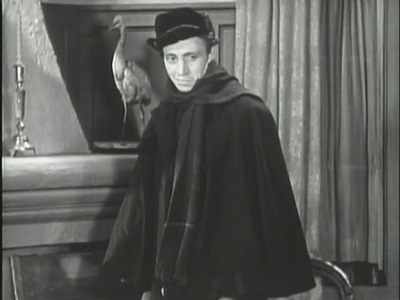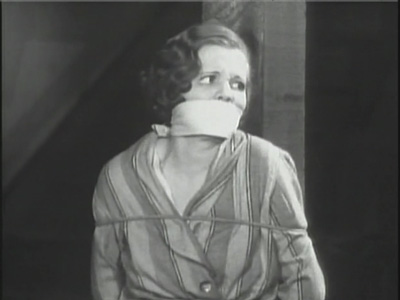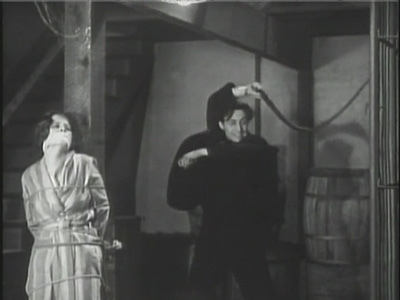Welcome to After the Silents, in which I explore the careers of silent film performers and crew after the talkies took over. Put on your rain gear, kids, because it’s going to be a dark and stormy night.
The film we are covering today was released at the height of the horror craze of the early 1930s. It’s a poverty row affair with a limited cast and all the action taking place on a single set. Also, there is an ape. And, naturally, that famous dark and stormy night.

What makes the film interesting in my book is that six out of the seven members of the cast appeared in silent films to varying degrees. After the review of the film, I will be briefly discussing their pre-sound careers.
Review
Availability
Available on DVD.
The film opens and the first thing we see is a dead body. (This review will go much better if you imagine me talking like Cary Grant in Arsenic and Old Lace.) It seems that a mad scientist has died and tonight is the reading of his will.
Our dead scientist had only one child, a daughter named Ruth (Vera Reynolds), who has been estranged from her father for quite some time. You see, the scientist kept apes in the house as subjects for his experiments and an aggressive male called Yogi took a dislike to the girl and tried to kill her.
Given a choice between Ruth and Yogi, the scientist chose the ape and Ruth moved out. She has now returned to hear the reading of her father’s will and she brings along her fiancé, Dr. Ted Clayton (Rex Lease), and their driver, Exodus (Willie Best billed as “Sleep n’ Eat.” Don’t ask).
The house is occupied by a creepy housekeeper, Mrs. Krug (Martha Mattox, who played the creepy housekeeper in The Cat and the Canary), and her equally creepy (and inexplicably accented) son, Hans (Mischa Auer).

Hans keeps Yogi locked in a cage in the basement and delights in tormenting the animal. I’m sure that won’t play into the plot at all. Also on hand is the lawyer, Herbert Wilkes (Sidney Bracey). Finally, there is Robert Earlton (Sheldon Lewis), brother of the dead man and Ruth’s uncle. He is paralyzed from the waist down.
Ruth inherits all of her father’s estate along with instructions to care for her uncle. If Ruth dies, then all the money will go to Robert. Meanwhile, Hans is cursing the dead scientist for not giving him a piece of the fortune. I can’t imagine anything coming of this.

Through the long night, Ruth is terrorized and nearly strangled by a hairy arm. Has Yogi escaped? Or is the culprit a human?
If you’re looking for a mystery, this ain’t it. It tries to be coy and be a proper whodunit but the who, why and how is ridiculously obvious from the first few minutes. (I’m spoiling the ending, by the way.) Hans is Robert’s illegitimate son and they are working together to murder Ruth. The ape enters into the plan as well because why not? But admit it, you already figured that out, didn’t you?

One reason why I am so hard on this film is that it could have easily been good. The bones of the story are solid. Illegitimate son with mommy AND daddy issues? Check! Seemingly benevolent uncle with murderous designs? Check! Emotional conflict between acknowledged and unacknowledged cousins? Check! This is good stuff. With a little more skill and care with the script, this could have been a low budget Old Dark House. Instead, it’s a shambles.

Even though most studios had the whole “talkie” thing down by 1932, The Monster Walks seems like it was made three or four years before. Everyone speaks slowly, enunciating for the microphone. There are weird pauses galore, especially from Lease and Auer. (“I’m gonna… kill you… both.”) The blocking is the very definition of unimaginative. The characters keep showing up in the same place and in the same positions. To be honest, it was a challenge to screen cap the film for this review.

In general, the performances are lousy. Willie Best shows good comedic timing and delivers the only funny line in the film. (“Well, there’s going to be another dead one,” he sighs as another character charges to confront the escaped ape.) However, the poor man is undone by the racist stereotypes heaped on his character. Exodus is portrayed as cowardly, badly educated and just not very bright. How charming. Need I say that this film is not for the easily offended. (Especially the film’s final line, which is so offensive that it made my jaw drop.)

The plot of the film borrows heavily—Martha Mattox essentially reprises her role– from The Cat and the Canary but it has neither the humor not the charm of the horror-comedy classic.
They may have borrowed plot and visual elements from The Cat and the Canary but the filmmakers managed to muff them. In the first place, The Cat and the Canary did a better job of establishing everyone as a suspect and gave each character a motive for murder. In the second, even if the heroine reacted instead of acted, at least she was played by the likable Laura La Plante and her leading man respected her fears and concerns and tried his best to be of assistance.

Dr. Clayton is the de facto protagonist of The Monster Walks in spite of being the person with the least at stake. But, you know, WASP guy = default human in this sort of film. (Pre-code films had a lot of feisty women but there were still damsels and square-jawed heroes in abundance.) I found Clayton annoying and not a very good doctor (at one point, he takes a pulse with his thumb) and just generally a square.

The worst thing is when he informs Ruth of things she already knows and acts like he deserves a gumball for doing it. And Ruth is ready to give him that gumball. (“Ted, I think I was the real target! Someone wants to kill me!” “Don’t be silly, Ruth… Wait! I think you were the real target. Someone wants to kill you!” “Oh, Ted, you’re so smart. Save me.”)
Ruth is constantly whining for Dr. Clayton to take her away. Um, she is an adult woman and the driver on staff seems more than ready to leave. Just wake up Exodus, tell him that you want him to live up to his name and skedaddle. Easy. Does she need her male guardian’s permission to travel or something? Lordy!

The movie reflects some of the unfortunate attitudes of the era. Exodus and Ruth are both infantilized and treated with smug indulgence by the rest of the cast, their fears dismissed as ignorant or hysterical. I should point out that there is a mad killer in the house. Fear seems perfectly reasonable, yes? If the others had listened, a lot of unpleasantness could have been avoided. Plus, Exodus is the only character with the sense to arm himself and yet he is treated like a dunce for not wishing to confront an enraged ape unnecessarily. Sigh.

Further, both Hans and Mrs. Krug are “othered” by emphasizing their foreign origins. There is no point in making them German other than to show that nice Americans would never do such a thing.
Ah, but was the German story meant to cover over Mischa Auer’s perceptible accent? Nope. Mrs. Krug and Hans are both supposed to be German, with Hans arriving in America as a baby. So why is he the one with the accent? Martha Mattox sounds perfectly American. And Auer’s accent is so Russian you can practically smell the ikra. Why bother with the German thing? Why not just make him Russian? And why does Dr. Clayton insist on saying Hans like it rhymes with pants?
Oh and what about that Pre-Code-iness? Not too much. The filmmakers just weren’t that imaginative.
(Unless you count this.)

The plot involving illegitimate kids counts, I guess, but there is not much detail and we never really learn the precise circumstances of Hans’ birth. (Secret marriage? Adultery?)
The Monster Walks was rereleased after Mischa Auer’s career took off. Naturally, he is given top billing. Without Auer this film would have likely sunk into well-deserved obscurity. It’s interesting to see the silent veterans at work but there are much better films that do the same thing. This is a turkey through and through. Watch at your own risk.
The Silent Cast
As I mentioned before, almost everyone in the cast was a veteran of silent films. Let’s briefly (and I do mean briefly) look at their careers.
Mischa Auer
Auer remains one of the most beloved character actors of Hollywood’s Golden Age. Like many stage personalities who flooded into the movies during the sound transition, Auer tested the movie game in a couple of silent films.
(Auer’s accent should neatly put to rest the notion that possessing a foreign voice meant immediate dismissal. You’d think Garbo would have done the trick but the myth lives on.)
Of course, Auer’s use of an ape as a scapegoat and murder weapon is humorous in retrospect considering his role in My Man Godfrey. Auer plays a bohemian moocher who does an acrobatic gorilla impression to amuse Carole Lombard (it doesn’t work). This time, playing the ape netted Auer an Oscar nod. What a difference four years makes.
(The Gorilla scene is below, should you care to enjoy.)
Vera Reynolds
Reynolds was a DeMille leading lady who never quite captured the public fancy. She played a major role in The Golden Bed, his last film for Paramount before he was forced out. When DeMille founded his own studio, Reynolds was one of the stars he took with him and she was paired with William Boyd in the epic slice of hokum, The Road to Yesterday. Reynolds and Boyd were easily the best thing about the picture.
Reynolds went on to star in program pictures for the DeMille company but the studio quickly collapsed under the weight of its debts, leaving its talent (including DeMille himself) high and dry. Reynolds hopped from studio to studio, weathering the sound transition and generally getting by. The Monster Walks was one of her last films.
Joseph Schildkraut harasses Vera in The Road to Yesterday:
Sheldon Lewis
Lewis is probably best remembered for the spectacularly strange 1920 version of Dr. Jekyll and Mr. Hyde that was made to rival the Barrymore version. However, he had been in the movies since 1914 and had supporting roles in The Exploits of Elaine, Orphans of the Storm and The Red Kimona. He successfully transitioned to sound and retired in 1936.
Martha Mattox
Mattox had been in the movies since 1913 but her role as the menacing housekeeper in The Cat and the Canary granted her screen immortality. (I certainly mentioned it enough.) She was a character actress who was always on hand when a spinster, housekeeper, aunt or schoolmarm was called for. She worked in films until her death in 1933.
Rex Lease
Lease was a veteran of westerns and youth comedies in the silent era (his earliest credit in 1924) and he switched almost exclusively over to quickie westerns in the 1930s. You know the type I mean. Films where the letter “G” simply does not exist. (Roarin’, Ridin’, Shootin’.) Still, it worked for him.
Sidney Bracey
Bracey had been in pictures for years (some sources say as early as 1909) but his most famous, beloved and recognizable role is as Marion Davies’ flustered director in Show People. He was never a star but Bracey had built a reputation as a reliable character actor and he worked steadily until his death in 1942. He played a collection of butlers, valets, doctors, press agents… Anything that required that little touch of class. His delivery was stagy but it worked for the persona that he had built.
***
One of the most annoying phrases I run into on user-edited sites (IMDB, Wikipedia) is: “One of the few to transition to sound.” That’s simply not true. Hollywood of the thirties was bursting at the seams with silent veterans. All it takes is a little research.
This was my contribution to the Pre-Code Blogathon, hosted by Pre-Code.com and Shadows and Satin. Be sure to check out the other posts!




I greatly enjoyed your delightful and informative review — and I must say it made me laugh out loud several times. (And you simply must tell me what the film’s last line was! Email me if you don’t want to write it — thedarkpages@yahoo.com. Don’t leave me on tenterhooks!) Thanks so much for this top-notch contribution to the blogathon!
Thanks so much! And the last line… Here is the last minute of the movie. But don’t say I didn’t warn you. 😉
PS, thanks so much for hosting!
Nice, a thirties old-dark-house-with-a-monster movie I haven’t gotten around to! Sounds terrible, but I’m sure I’ll get a laugh out of it. Thanks for the review.
Worth seeing for fans of the genre. If nothing else, you can count all the ways they get things wrong. 😉
Forewarned is forearmed. Thanks for the heads-up and the laughs.
My pleasure 🙂
Wow, the last line…. Talk about tasteless and offensive…. I don’t now if I could sit through this; you’re a strong one, I tell you.
Yeah, pretty horrendous. I kept myself alive by giggling every time Dr. Clayton said “Hants”
I’m sorry for Willie and Stepnfetchit and Mantan Moreland and the other countless men and women who had these thankless parts and played them as best they could. I appreciate your always highlighting the the discomfort you/we feel in watching these stereotyped characters.
Also, your great reviews make all of these movies worth watching.
Thanks.
Thank you so much! Yes, the wasted talents of these fine performers is one of the great tragedies of classic cinema. We can only imagine how funny they would have been if they had been allowed to be characters instead of stereotypes.
All your reviews are marvelous, but the ones where you’re slamming the movie are the best in my book. You had me laughing out loud several times. Great job!
Thanks so much!
I have never heard of this one, but an early poverty row horror with an ape?! Sign me up! Loved THE OLD DARK HOUSE, and if this is a crappier and perhaps more insane version of that (which it sounds like, to an extent), then that just makes it all the more entertaining. I definitely need to check this out, despite the last line, which, as you warned, is pretty shocking, even considering the era.
You have to give this turkey props for a… unique vision. 😉